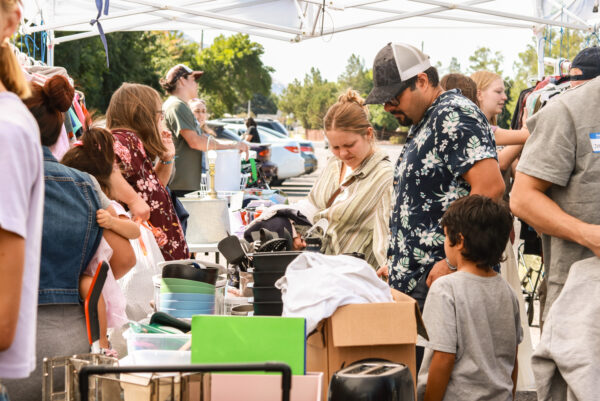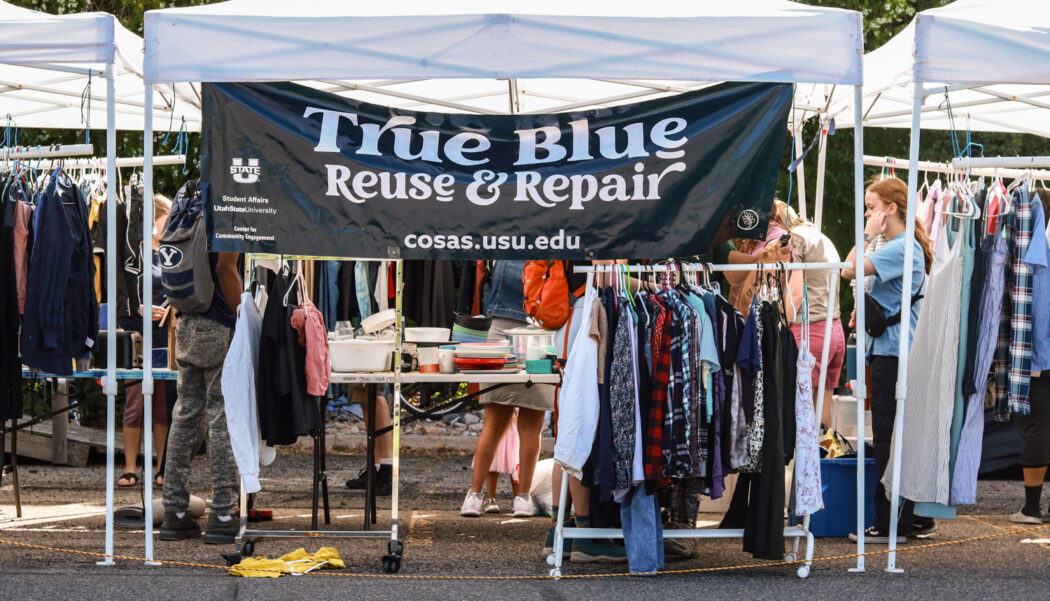Ethical consumption on campus with True Blue Reuse & Repair
When it comes to reducing, reusing and recycling on the USU campus, True Blue Reuse & Repair takes the cake. The program has been promoting sustainability and anti-consumption through the reuse and repair of goods since 2016 via pop-up shops, donations and volunteer opportunities.
Annie Watson has been the True Blue Reuse & Repair lead for a year and a half and has been involved in the program for two years.
“Our main goal is helping students be educated and aware of their carbon footprint and the emissions that are produced through consumption,” Watson said. “We basically take donations, sort through them and provide opportunities for students to make use of second-hand goods on campus.”
According to the True Blue Reuse & Repair website, mass production and unethical consumption of goods not only negatively impact the planet but negatively impacts the people working within those industries. The program encourages buying local and buying second-hand in order to promote fair labor, safer working conditions and environmental sustainability.
“It’s degrading to our planet to over-consume more than we need when our resources are already so limited,” Watson said. “If you’re unhappy with people in poor working and living conditions, then you shouldn’t be consuming items that are mass produced in Vietnam, Bangladesh, China.”
To help bring attention to their goal of ethical consumption, True Blue Reuse & Repair holds pop-up shops and events where students can take, buy or swap goods to be reused and recycled, instead of throwing those items away.
“Our mission is trying to keep household goods and textiles out of landfills,” Watson said. “It can also help ease economic burdens for students — having really affordable goods when it is hard enough paying tuition for school.”
One of the pop-up shops held by the program is an annual free pop-up shop at the beginning of the school year.

People peruse clothing free to take at the True Blue Reuse and Repair popup event organized by COSAS on Aug. 24.
“We have tons of good condition clothing, as well as kitchen goods and some cute little decor items,” Watson said.
These pop-up shops encourage students on and off campus to make more sustainable choices when it comes to their consumption.
“So many countless things we just buy to buy for buying’s sake and not necessarily for the value that the item brings us or for its use,” Watson said. “Just because you have more stuff doesn’t necessarily mean you’re adding value to your life — doesn’t necessarily mean you’re buying things that you need.”
True Blue Reuse & Repair takes donations all year long at their office in TSC 316A.
“Students can go in there any time of day from nine to five and be able to buy clothing for really cheap prices,” Watson said. “Or they can offer service/volunteer hours in exchange for some of our items, or they can donate some clothing and get a piece in return.”
Through the repair services offered by the program, students can bring in clothing to be mended or tailored by the people working with True Blue Reuse & Repair. Students can also volunteer for True Blue Reuse & Repair and become a part of the repair process themselves.
“If you’re interested in sewing or clothing design, we have opportunities for fixing and repair, as well as taking old goods, cutting them up and turning them into something completely new.”
The program strives to find ways to repair or upcycle goods that can’t be sold or reused, such as the refurbishment of old jeans into tote bags, signs and stuffing, or the cutting up of old bike tires to turn them into toiletry bags.
“Your imagination is the limit when it comes to being able to up–cycle old clothing,” Watson said. “We are always looking for volunteers.”
Emmy Noel is the Center for Community Engagement marketing lead under the Christensen Office of Social Action and Sustainability and is involved with the True Blue Reuse & Repair program through their position.
“With these sorts of events, it’s trying to get people to know that we exist,” Noel said. “So that when it comes around, and they have a bag of clothes that they’re looking to donate somewhere, they’re like, ‘Hey, I can donate to this resource on campus?’”
Noel’s interest in sustainability has largely contributed to their involvement with the program. They find this resource extremely important, especially for spreading awareness about sustainability on campus.
“There is a hard line when it comes to consumption and being sustainable and mindful about that through the materials you’re purchasing and where you’re getting them from,” Noel said.
“It really all just comes back to reduce, reuse and recycle — and recycling things instead of sending them to the landfill.”

